Becoming a Parent to Your Own Parents


Written and verified by the psychologist Valeria Sabater
We tend to think that old age comes gradually and calmly like the passing seasons. However, in reality, often, far from arriving slowly, old age appears suddenly, almost abruptly. It’s then that you might find yourself becoming a parent to your own parents.
There’s usually something in particular that happens that forces you to become aware of your parent’s age and condition. It might be a fall and a broken hip, that painful knee pain that ends up having to be replaced, or the forgetfulness that becomes ever more constant. In fact, suddenly, and without really knowing how, your mother or father who, despite their age, to date has been able to handle everything, now needs a great deal of help.
Your parents becoming dependent upon you is always a turning point. It’s that emotional event that demonstrates to you that real old age, the kind that restricts life can suddenly appear, along with life-limiting illnesses. From always being there for you when you need them, your parents now need you.
No one —at least almost no one— is prepared for this event.
We all take it for granted that our parents will always be capable and independent, but there almost always comes a time when they’ll need our help.

How to cope with becoming a parent to your own parents
A part of you probably took it for granted that your parents would never grow old. Furthermore, you thought that they’d fend for themselves until they were pretty old, and they’d be available day and night providing you with constant support, 24//7. Nevertheless, as we mentioned earlier, there comes a day when the phone rings and you find out that your mom or dad is in hospital.
The doctors will tell you that it’s simply part of life. However, you look at your parents and they look at you and, right at that moment, you both realize that, sometimes, the passing of time is cruel. It also brings with it uncertainty and change.
Becoming parents of your own parents means you must first deal with the difficult process of acceptance. This is a role that seems unnatural and even distorted. Nevertheless, it’s reality and requires, from you, acts of responsibility, love, and humanity.
How do you manage this new stage? Let’s take a look.
Becoming a caregiver for your parents is a role it isn’t easy to adopt. It’s also hard for your parents, as they don’t like being dependent on you.
A particular grieving process: from denial to acceptance
When your parents stop looking after themselves, you become their ‘caretakers’. It isn’t easy to integrate this new role into the family dynamics or in your own daily life. Therefore, you need to know how to handle this set of conflicting feelings.
It’s common to feel sadness mixed with fear, anger, and constant questions (Why has it happened to them? They were so fit and well). Try and avoid silencing your emotions and feelings. Also, accept that not all questions have an answer. Giving presence to each emotion, accepting the new situation, and venting your feelings with people who listen to you and understand will be a good start.
Your parents must learn how to become ‘children’
It’s likely that your parents have been accustomed to having authority. They’ve probably spent their entire existence having full control over their lives and making their own decisions. Furthermore, if there’s one thing they’re used to, it’s parenting. Also, being grandparents. It’s not easy for them to suddenly find themselves dependent on their own children. Indeed, losing their authority, as well as their ability to fend for themselves, can be extremely traumatic for them. It’s important that you’re aware of their feelings.
A study conducted by several universities in the United States claimed that depression may appear to be less frequent in the elderly because it’s not always diagnosed. As a matter of fact, depression in the elderly has more severe effects, and can lead to dementia. This is important to bear in mind.
Inside of you is a child who longs for their father or mother, those who, not so long ago, would’ve done anything to help and support you.
Specialized advice and support from the environment
In this situation, you need support both for your dependent parent and yourself. Indeed, it’s essential that you have the advice of specialized professionals, such as doctors or gerontologists. After all, caring doesn’t only mean caring for their sick body, you also have to be sensitive to their minds and their emotional well-being. You should also make sure that they don’t become isolated. They need to stay connected to their social environment, friends, and the entire family network, as well as you.
Make sure you also have support. Your friends and your partner should be your daily allies.

Learning to love your parents in a new way
Perhaps your relationship with your dependent father or mother wasn’t too good. Indeed, these kinds of familial links are often woven with friction, disagreements, differences in values, and even unresolved hurt.
However, when your parents become dependent on you, you might find your relationship changes. Their attitudes and your own sensitivity might well alter, resulting in a purer bond that’s free of rancor.
In fact, this stage of life, though hard at times, can also be enriching and full of a more complete and beautiful love that’s worth experiencing and remembering. Finally, becoming a parent to your own parents is painful, but you’ll never carry out another act that’s so natural, decent, and kind.
All cited sources were thoroughly reviewed by our team to ensure their quality, reliability, currency, and validity. The bibliography of this article was considered reliable and of academic or scientific accuracy.
- Fiske A, Wetherell JL, Gatz M. Depression in older adults. Annu Rev Clin Psychol. 2009;5:363-89. doi: 10.1146/annurev.clinpsy.032408.153621. PMID: 19327033; PMCID: PMC2852580.
- Hareven, T. (2001). Historical perspectives on aging and family relations. In R. Binstock & L. K. George (Eds.), Handbook of aging and social sciences (5th ed., pp. 141–159). San Diego, CA: Academic Press.
- Hayslip, B., & Patrick, J. H. (2002). Working with custodial grandpar New York: Springer.
- Pearlin, I., Pioloi, M. F., & McLaughlin, A. E. (2001). Caregiving by adult children. In R. Binstock & L. K. George (Eds.), Handbook of aging and social sciences (5th ed., pp. 238–254). San Diego, CA: Academic Press.
- Uhlenberg, P. (1996). The burden of aging: A theoretical framework for understanding the shifting balance of caregiving and care receiving as cohorts Gerontologist, 36,761–767.
- Kimont, K. (2017, May 15). Women Provide More Elderly Care Than Men & It’s Taking a Toll. Romper. Retrieved on October 22, 2018 from: https://www.romper.com/p/women-provide-more-elder-care-than-men-its-tak…
This text is provided for informational purposes only and does not replace consultation with a professional. If in doubt, consult your specialist.








